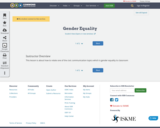
This lesson is about how to relate one of the civic communication topics which is gender equality to classroom
- Subject:
- Languages
- Material Type:
- Activity/Lab
- Author:
- Hala Gharib
- Date Added:
- 09/20/2022

This lesson is about how to relate one of the civic communication topics which is gender equality to classroom

Does it matter in education whether or not you’ve got a Y chromosome? You bet it does. In this discussion-based seminar, we will explore why males vastly outrank females in math and science and career advancements (particularly in academia), and why girls get better grades and go to college more often than boys. Do the sexes have different learning styles? Are women denied advanced opportunities in academia and the workforce? How do family life and family decisions affect careers for both men and women?
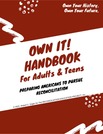
The “Own It!” Handbook for Adults & Teens is a step-by-step guide to a fourteen topic after-school program, such as a Boys & Girls Club, or an adult Community Building group. For adults, it seeks to bridge divides and explore what Americans have in common. For teens, it is a transformative after-school, trauma-informed enrichment program. It nurtures academic skills, personal growth and leadership. For all, it uses history to connect our past to our future, as part of the Own Your History® (OYH) Collection. Our inheritances from family history and the American experience provide the starting point for our personal journeys. Our individual stories are part of a complex American history. We each can choose consciously to write our life story and work for a greater future. Own It! is not “school” but enhances students’ engagement in being creative, making things happen, and achieving goals. Its mission is to help them step up and enrich their lives, especially by understanding that they live in history.
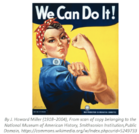
The first wave of the Women’s Liberation Movement (also known as “feminism”) occurred during the mid to late-1800s. The main objective was votes for women. In the mid-1960’s, the second wave of feminism appeared with a goal for women to obtain a stronger role in American society. This lesson will examine the second wave of the Women’s Liberation Movement by exploring the changes in the traditional role of women and discovering the role that The Feminine Mystique played in those societal changes. You will discover how the Women’s Movement is still pushing for equality today.StandardsCC.8.5.9-10.D Determine the meaning of words and phrases as they are used in a text, including vocabulary describing political, social, or economic aspects of history/social science.CC.8.6.9-10.G Gather relevant information from multiple authoritative print and digital sources, using advanced searches effectively; assess the usefulness of each source in answering the research question; integrate information into the text selectively to maintain the flow of ideas, avoiding plagiarism and following a standard format for citation.

The first wave of the Women’s Liberation Movement (also known as “feminism”) occurred during the mid to late-1800s. The main objective was votes for women. In the mid-1960’s, the second wave of feminism appeared with a goal for women to obtain a stronger role in American society. This lesson will examine the second wave of the Women’s Liberation Movement by exploring the changes in the traditional role of women and discovering the role that The Feminine Mystique played in those societal changes. You will discover how the Women’s Movement is still pushing for equality today.StandardsCC.8.5.9-10.D Determine the meaning of words and phrases as they are used in a text, including vocabulary describing political, social, or economic aspects of history/social science.CC.8.6.9-10.G Gather relevant information from multiple authoritative print and digital sources, using advanced searches effectively; assess the usefulness of each source in answering the research question; integrate information into the text selectively to maintain the flow of ideas, avoiding plagiarism and following a standard format for citation.

The first wave of the Women’s Liberation Movement (also known as “feminism”) occurred during the mid to late-1800s. The main objective was votes for women. In the mid-1960’s, the second wave of feminism appeared with a goal for women to obtain a stronger role in American society. This lesson will examine the second wave of the Women’s Liberation Movement by exploring the changes in the traditional role of women and discovering the role that The Feminine Mystique played in those societal changes. You will discover how the Women’s Movement is still pushing for equality today.StandardsCC.8.5.9-10.D Determine the meaning of words and phrases as they are used in a text, including vocabulary describing political, social, or economic aspects of history/social science.CC.8.6.9-10.G Gather relevant information from multiple authoritative print and digital sources, using advanced searches effectively; assess the usefulness of each source in answering the research question; integrate information into the text selectively to maintain the flow of ideas, avoiding plagiarism and following a standard format for citation.

This course explores the ideal of social justice. What makes a society just? We will approach this question by studying three opposing theories of justice—utilitarianism, libertarianism, and egalitarian liberalism—each foundational to contemporary political thought and discourse.

The Declaration of Independence and the words “all men are created equal” provided thousands of enslaved Africans high expectations and many were ready to fight for the Country and their own personal freedom. Thousands of enslaved Africans impacted the war right from the start at Lexington and Concord, all the way to the end at Yorktown. This lesson will explore the life of James Armistead Lafayette, an enslaved African Virginian. Working as an undercover spy for George Washington, James risked his life to gather key intelligence about the British that helped secure an American victory at Yorktown. In this lesson, we will discuss whether his efforts in service of the American cause helped or hindered his ability to achieve emancipation.

As events of the last few years have shown, the Supreme Court has played a crucial role in American political life. There is practically no issue of social significance in the American past that did not at some point end up in the nation’s courtrooms, yet much of the workings of the constitution remain obscure. This subject is designed to introduce students to the main themes and events of American constitutional law since 1787. It introduces terms and concepts of law and legal history, focusing on three recurring themes in American public life: liberty, equality, and property. Readings consist mostly of original court cases, especially from the U.S. Supreme Court, but the focus of the class is on the historical connections between those cases and broader social, political, and cultural trends.

This course explores the history of the ideal of personal freedom with an eye towards contemporary debates over the pros and cons of the regulatory state. The first part of the course surveys the sociological and theological sources of the concepts of freedom and civil society, and introduces liberty’s leading relatives or competitors: property, equality, community, and republicanism. The second part consists of a series of case studies in the rise of modern liberty and libertarianism: the abolition of slavery, the struggle for religious freedom, and the twentieth-century American civil liberties movement. In the last part of the course, we take up debates over the role of libertarianism vs. the regulatory state in a variety of contexts: counter-terrorism, health care, the financial markets, and the Internet.
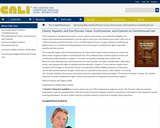
This Casebook is intended to be used in a course which concentrates on Constitutional Rights and centers the Fourteenth Amendment. It can be used in a first year Law School course with a title such as “Liberty, Equality, and Due Process,” as it is at CUNY School of Law, an upper division Constitutional Rights course, or an advanced undergraduate course focusing on constitutional rights, especially equality and due process.
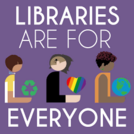
Dear friends, the five laws of library science implies that, Libraries are for everyone, but in real practice, do I find the same thing?

This course examines the modern definition of freedom, and the obligations that people accept in honoring it. It investigates how these obligations are captured in the principles of our political associations. This course also studies how the centrality of freedom plays out in the political thought of such authors as Hobbes, Locke, Rousseau, Burke and Montesquieu, as well as debating which notions of freedom inspire and sustain the American experiment by careful reading of the documents and arguments of the founding of the United States.
This course is part of the Concourse program at MIT.

This course will focus on issues that arise in contemporary public debate concerning matters of social justice. Topics will likely include: euthanasia, gay marriage, racism and racial profiling, free speech, hunger and global inequality. Students will be exposed to multiple points of view on the topics and will be given guidance in analyzing the moral frameworks informing opposing positions. The goal will be to provide the basis for respectful and informed discussion of matters of common moral concern.

This course will focus on issues that arise in contemporary public debate concerning matters of social justice. Topics will likely include: euthanasia, gay marriage, racism and racial profiling, free speech, hunger and global inequality. Students will be exposed to multiple points of view on the topics and will be given guidance in analyzing the moral frameworks informing opposing positions. The goal will be to provide the basis for respectful and informed discussion of matters of common moral concern.

How do counter narratives in our communities demonstrate that the historic ideals of liberty and equality born in the Enlightenment have become increasingly accessible to more communities today through the efforts of individuals or organizations?
This unit will examine the traditional themes of the European Enlightenment such as liberty and justice. Students will then explore how the same thinkers who left a legacy of proposed freedoms also created systemic discrimination for many communities. After engaging with primary sources and examining the history of imperialism, students will review news stories funded by the Pulitzer Center that connect this legacy to current global events. Ultimately students will create their own projects highlighting a narrative in their own community that counters traditional Enlightenment legacies. The idea is to identify and report on the disruptors to the past stereotypes.

This lesson focuses on early Asian immigrants to the United States, their reasons for immigration, successes they experienced, challenges they faced, and the changing reception they received in their host country. Students will learn what an immigrant is, what it means to be an “American, what the American Dream is, and how primary sources and secondary sources provide varied perspectives that inform a deeper understanding of an event.
2021 Social Science Standards Integrated with Ethnic Studies:
Civics and Government: K.1, 3.2, 5.1
Historical Knowledge: 2.16, 5.22
Historical Thinking: K.17, K.18, 2.22
Social Science Analysis: 1.19, 1.21, 3.18, 3.19, 4.24, 5.27

The course is an introduction to the approach of Reflective Practice developed by Donald Schön. It is an approach that enables professionals to understand how they use their knowledge in practical situations and how they can combine practice and learning in a more effective way. Through greater awareness of how they deploy their knowledge in practical situations, professionals can increase their capacities of learning in a more timely way. Understanding how they frame situations and ideas helps professionals to achieve greater flexibility and increase their capacity of conceptual innovation.
The objective of the course is to introduce students to the approach and methods of reflective practice by raising their awareness about their own cognitive resources and how they use them in their practice. The course will introduce theories of learning, knowledge generation, framing and reframing, theories of action, reflection-in-practice, and conceptual innovation, and provide students with opportunities to experiment with these theories in real life through practical exercises in which they reflect on real situations that they have faced in their past professional experience. Through these practical exercises, students will have the opportunity to reflect on their thinking capacities in the context of their practice.

Information regarding the current refugee crisis. Addresses causes for concern and debunks common myths about the refugee program.
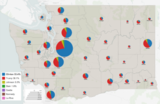
While the arrival of explorers and the beginning of the fur trade were going on in the American Northwest, a new nation was being born in the east. This is the teacher guide companion to The State We're In: Washington (Grade 3-5 Edition) Chapter 3. The resource is designed to engage students with a launch activity, focused notes, and a focused inquiry.